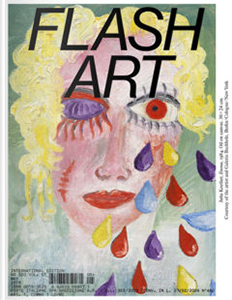Special feature on painter
Jutta Koether (with Kerstin Stakemeier,
Quinn Latimer…);
Ericka Beckman on her pioneering works; Julia Phillips's sculptures; musician Kamasi Washington's unmistakable groove;
Yngve Holen's new body of work Rose Painting; Tess Edmonson on adapting Archie in the CW's
Riverdale; Alexandra Pirici's materiality-burdened performances; reviews…
The cover of this issue features an early work by Jutta Koether, a central figure in the recent history of painting and the subject of a survey exhibition opening later this month at Museum Brandhorst, Munich. Since the 1980s, Koether has engaged in an intimate “battle” against painterly tradition, developing a defiant artistic practice able to sketch out a counterhistory of the modernist, male-dominated and heteronormative canon. As Kerstin Stakemeier writes in one of the contributions to the twenty-page dossier dedicated to Koether that this issue also features, “Koether does not legitimize herself against painterly tradition, but rather lets its accumulated unmodernness come to her.” Stakemeier discusses Koether's practice in the gendered and art-historical afterlife of mannerism, underlining the artist's agenda to reconfigure her references “under female competence.” “Koether's application of painting history ‘under female competence' changes its societal position entirely,” Stakemeier concludes.
In addition to an article by Quinn Latimer considering Koether's novella
f., the dossier includes a reprint of one of Koether's many contributions to
Flash Art. In “Pure Invention,” first published in the April 1986 issue of the magazine, Koether reflects on a group of her female artist peers who have defied the status quo—from Georgia O'Keeffe to Cindy Sherman, from Jenny Holzer to Rosemarie Trockel. “Women artists are obsessively afraid of being understood as just that, as women artists,” Koether writes. “Often they prefer to lurk anonymously and mutely in isolation, considering intervention in history as a burden. It isn't their history anyway.” Countering what she calls the “embarrassing and sick excesses of self-recrimination” of 1970s feminist art, Koether invites women artists to “speak up” by developing creative strategies that transcend a discourse of self with pure artistic invention. In Koether's vision for female art “defensiveness is forbidden.”
Flash Art is a contemporary art and culture magazine founded in 1967. Within a decade, it became an indispensable point of reference for artists, critics, collectors, galleries, and institutions. In 2020, Flash Art became a quarterly publication, at the same time increasing its trim size and updating its graphic identity. The magazine offers a fresh perspective on the visual arts, covering a range of transdisciplinary approaches and fostering in-depth analyses of artist practices and new cultural directions. Today, Flash Art remains required reading for all who navigate the international art scene.
Flash Art is known for it covers featuring artists who subsequently become leading figures in the art world. The magazine includes photoshoots, productions, critical essays, monographic profiles, conversations with emerging and established artists, and a range of ongoing and thematic columns that change every few years. The long history of the magazine is also highlighted by pivotal texts from the archive that are included in the publication time to time. Finally, every issue offers a highly curated selection of the best institutional exhibitions on the global scene.

